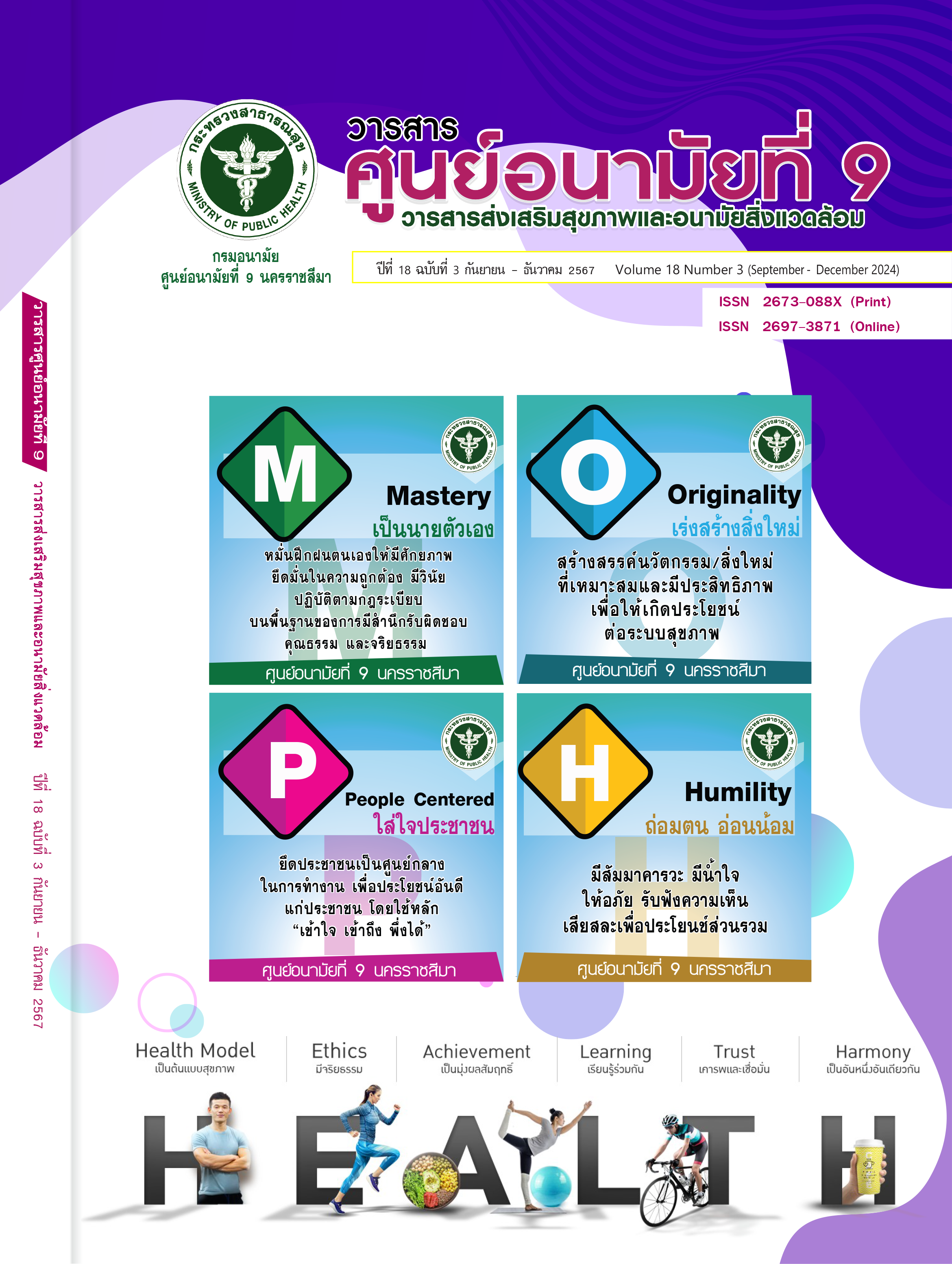ผลของการโค้ชด้านสุขภาพต่อระดับน้ำตาลเฉลี่ยสะสมในเลือด ของผู้ที่เป็นเบาหวานชนิดที่ 2
คำสำคัญ:
การโค้ชด้านสุขภาพ, น้ำตาลเฉลี่ยสะสมในเลือด, เบาหวานชนิดที่ 2บทคัดย่อ
การวิจัยกึ่งทดลองนี้มีวัตถุประสงค์เพื่อศึกษาผลของการโค้ชด้านสุขภาพต่อระดับน้ำตาลเฉลี่ยสะสมในเลือดของผู้ที่เป็นเบาหวานชนิดที่ 2 กลุ่มตัวอย่าง คือ ผู้ที่เป็นเบาหวานชนิดที่ 2 ในชุมชนตำบลบ้านเกาะ อำเภอเมือง จังหวัดนครราชสีมา จำนวน 60 ราย แบ่งเป็นกลุ่มทดลองและกลุ่มควบคุม กลุ่มละ 30 ราย จับคู่ให้มีคุณสมบัติใกล้เคียงกันในเรื่อง เพศ อายุ และระดับน้ำตาลเฉลี่ยสะสมในเลือด กลุ่มควบคุมได้รับการดูแลตามปกติ ส่วนกลุ่มทดลองได้รับการโค้ช เครื่องมือที่ใช้ในการทดลอง ได้แก่ แผนการโค้ช เครื่องมือที่ใช้ในการรวบรวมข้อมูล ได้แก่ แบบบันทึกค่าระดับน้ำตาลเฉลี่ยสะสมในเลือด และแบบสอบถามพฤติกรรมสุขภาพ วิเคราะห์ข้อมูลโดยใช้ร้อยละ ค่าเฉลี่ย ส่วนเบี่ยงเบนมาตรฐาน และทดสอบด้วยสถิติทดสอบที
ผลการวิจัยพบว่า 1) ค่าเฉลี่ยระดับน้ำตาลเฉลี่ยสะสมในเลือดของผู้ที่เป็นเบาหวานชนิดที่ 2 ภายหลังได้รับการโค้ชด้านสุขภาพต่ำกว่าก่อนการทดลอง อย่างมีนัยสำคัญทางสถิติที่ระดับ 0.05 (p<0.001) และ 2) ค่าเฉลี่ยระดับน้ำตาลเฉลี่ยสะสมในเลือดของผู้ที่เป็นเบาหวานชนิดที่ 2 ภายหลังได้รับการโค้ชด้านสุขภาพต่ำกว่ากลุ่มที่ได้รับการดูแลตามปกติ อย่างมีนัยสำคัญทางสถิติที่ระดับ 0.05 (p<0.001) ผลการวิจัยชี้ให้เห็นว่า การโค้ชด้านสุขภาพสามารถทำให้ระดับน้ำตาลเฉลี่ยสะสมในเลือดของผู้ที่เป็นเบาหวานชนิดที่ 2 ลดลงได้
เอกสารอ้างอิง
International Diabetes Federation. IDF Diabetes Atlas 2021 [Internet]. 2021[cited 2022 Jan 15]. Available from: https://www.diabetesatlas.org
Diabetes Association of Thailand under The Patronage of Her Royal Highness Princess Maha Chakri Sirindhorn, Endocrine Society of Thailand, Department of Medical services, National Health Security office, Thailand, Clinical practice guideline for diabetes 2023. Bangkok: Srimuang Printing; 2023. (in Thai)
Health Data Center, Ministry of Public Health. DM Report 2023 [Internet]. 2023 [cited 2023 Jul 4]. Available from: https://hdcservice.moph.go.th/hdc/reports/report.php?source=kpi/kpi.php&cat_id=cf7d9da207c0f9a7ee6c4fe3f09f67dd&id=848b5045eab655b7be0069efcc445dd9
Sroisong S, Rueankon A, Ngaoratsamee J, Janwijit S, Fuongtong P, Kaewtankham K. Self-care behavior among patients with type 2 diabetes mellitus. Journal of Disease and Health Risk DPC.3 2020;14(1):35-47. (in Thai)
Hanput D, Rahothan N. Self-care behaviors of type 2 diabetes patients at Danchang hospital. Journal of Health and Nursing Ubon Ratchathani University. 2023;2(2):127-38. (in Thai)
Nukulkit S, Sareerat T. Effectiveness of health promotion program with group process on the self–care behaviors modification of type 2 diabetic patients at Sukkasem Community Health Center, Tambon Tatcheungchum, Muang, Sakon Nakhon. Journal of Sakon Nakhon Hospital 2018;21(1):77-86. (in Thai)
Kanai Health Promoting Hospital. DM statistics report 2020-2022. Nakhon Ratchasima: Kanai Health Promoting Hospital; 2023. (in Thai)
Kanai Health Promoting Hospital. Focus group report: DM care system analysis. Nakhon Ratchasima: Kanai Health Promoting Hospital; 2023. (in Thai)
Haas SA. Coaching. Developing key players. J Nurs Adm. 1992 Jun;22(6):54-8.
Department of Health Service Support, Ministry of Public Health. Promoting health behaviors in accordance with the 3E. 2S [Internet]. [cited 2022 Jan 15]. Available from: http://live.siammedia.org/index.php/article/chit-chat-health/21163
Cohen J. Statistical Power analysis for the behavioral sciences (2nd ed.). Hillsdale, NJ: Lawrence Erlbaum Associates, Publishers; 1988.
Pikun P, Navicharern R. The effect of coaching program for lifestyle modification on HbA1C level in newly diagnosed type 2 diabetic persons. Royal Thai Navy Medical Journal 2016;43(2):55-73. (in Thai)
Tienthavorn V. Surveillance system, control, prevention of diabetes, hypertension in Thailand: policy to action (3rd ed.). Bangkok: Federation of Savings and Credit Cooperatives of Thailand Limited; 2013. (in Thai)
Sherifali D. Diabetes coaching for individuals with type 2 diabetes: A state-of-the-science review and rationale for a coaching model. J Diabetes. 2017 Jun;9(6):547-554. doi: 10.1111/1753-0407.12528.
Sirikunwiwat J, Navicharern R. The effect of the coaching program in health behaviors modification on HbA1C of persons with pre-diabetes. Journal of Nursing Science Chulalongkorn University 2019;31(2):10-22. (in Thai)
Yu-Mei Chen D, Wu XV, Chan EY, Goh YS. Nurse-Led Tele-Coaching on Modifiable Cardiovascular Risk Factors in People with Type 2 Diabetes Mellitus: A Systematic Review and Meta-Analysis. Worldviews Evid Based Nurs. 2019 Dec;16(6):424-432. doi: 10.1111/wvn.12409.
Pirbaglou M, Katz J, Motamed M, Pludwinski S, Walker K, Ritvo P. Personal Health Coaching as a Type 2 Diabetes Mellitus Self-Management Strategy: A Systematic Review and Meta-Analysis of Randomized Controlled Trials. Am J Health Promot. 2018 Sep;32(7):1613-1626. doi: 10.1177/0890117118758234.
ดาวน์โหลด
เผยแพร่แล้ว
รูปแบบการอ้างอิง
ฉบับ
ประเภทบทความ
สัญญาอนุญาต
ลิขสิทธิ์ (c) 2024 วารสารศูนย์อนามัยที่ 9 : วารสารส่งเสริมสุขภาพและอนามัยสิ่งแวดล้อม

อนุญาตภายใต้เงื่อนไข Creative Commons Attribution-NonCommercial-NoDerivatives 4.0 International License.
บทความหรือข้อคิดเห็นใด ๆ ที่ประกฎในวารสารศูนย์อนามัยที่ 9 เป็นความคิดเห็นของผู้เขียน บรรณาธิการ คณะผู้จัดทำ และศูนย์อนามัยที่ 9 นครราชสีมา (เจ้าของ) ไม่จำเป็นต้องเห็นด้วย ผู้เขียนต้องรับผิดชอบต่อบทความของตนเอง
ผลการพิจารณาของกองบรรณาธิการและผู้ทรงคุณวุฒิถือเป็นที่สิ้นสุด คณะบรรณาธิการวารสารฯ ขอสงวนสิทธิ์ในการตรวจแก้ไขข้อความให้ถูกต้องตามหลักภาษาและมีความเหมาะสม
กองบรรณาธิการวารสารฯ ขอสงวนสิทธิ์มิให้นำเนื้อหาใด ๆ ของบทความ หรือข้อคิดเห็นใด ๆ ของผลการประเมินบทความในวารสารฯ ไปเผยแพร่ก่อนได้รับอนุญาตจากกองบรรณาธิการ อย่างเป็นลายลักษณ์อักษร และผลงานที่ได้รับการตีพิมพ์ถือเป็นลิขสิทธิ์ของวารสารศูนย์อนามัยที่ 9


